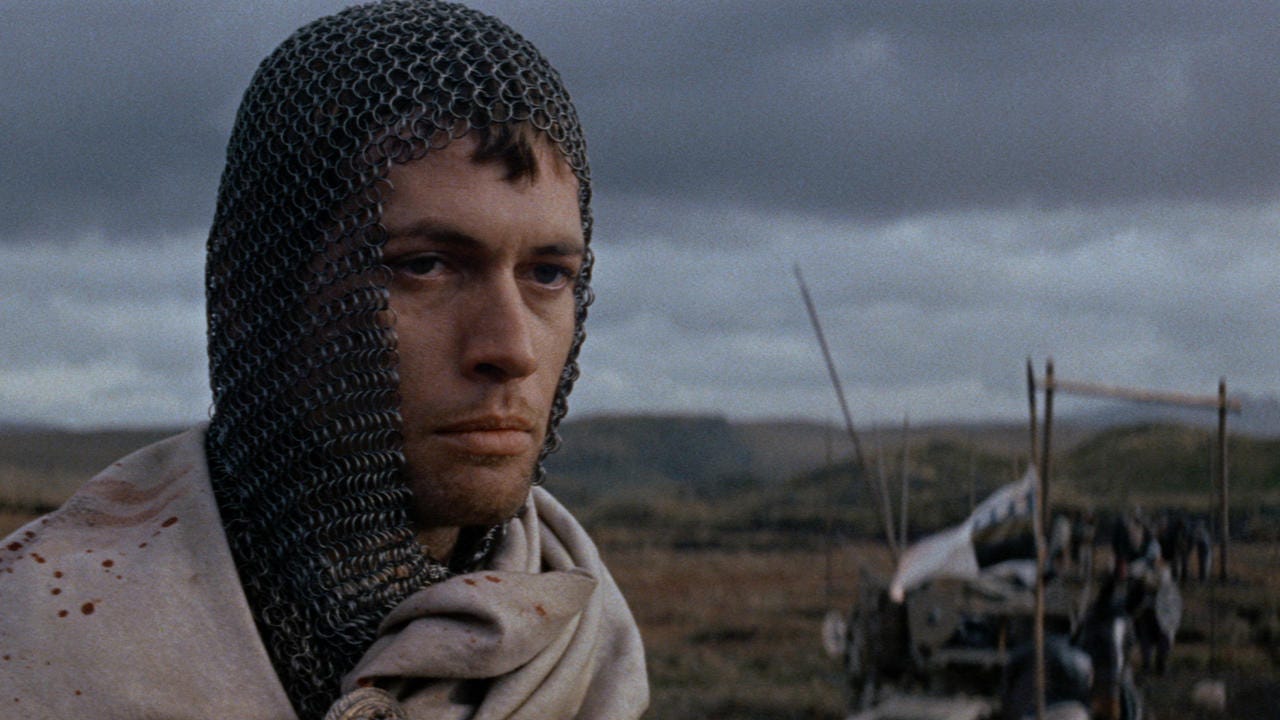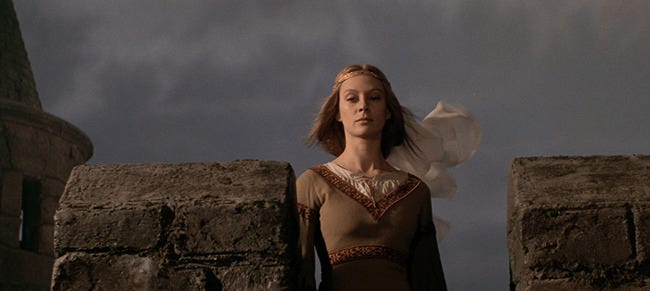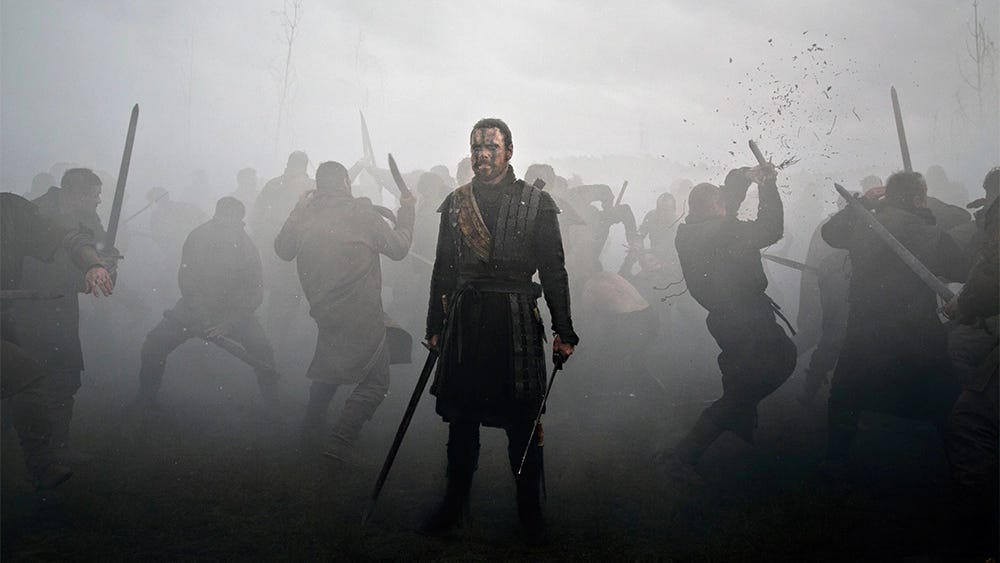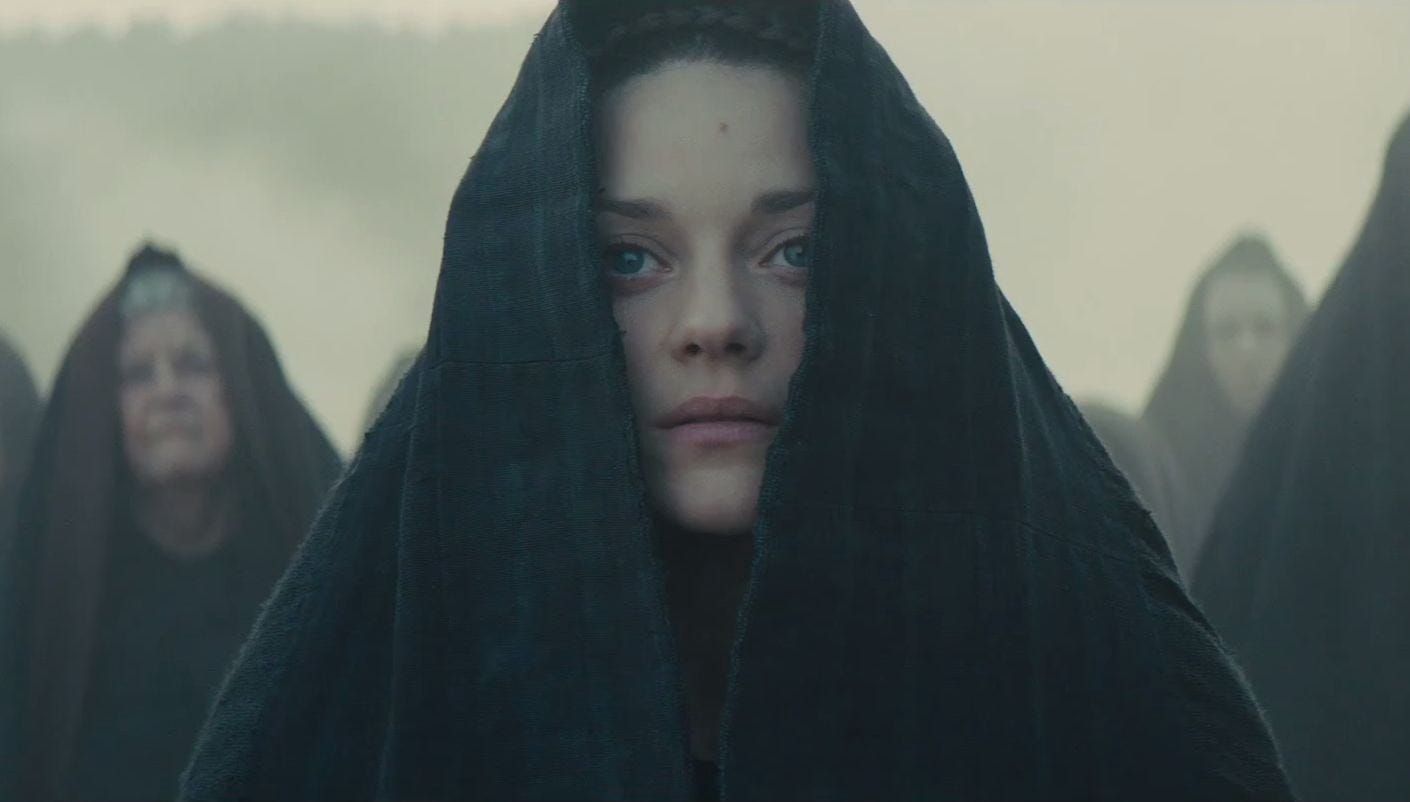Dialogue: 'Macbeth' and the Movies: Part Two
All the perfumes of Arabia will not sweeten Roman Polanski and Justin Kurzel's bold takes on 'Macbeth,' the two bloodiest adaptations of the play.
In the lead-up to Joel Coen’s The Tragedy of Macbeth, slated for limited release this Christmas and Apple TV+ on January 14th, we wanted to have a conversation about the most significant attempts to bring “the Scottish play” to the biggish screen. That exchange will run in three parts. Last week we discussed Macbeths from Orson Welles and Akira Kurosawa’s Macbeth-inspired Throne of Blood. Up for discussion this week: a 1971 adaptation from Roman Polanski and a 2015 take from Justin Kurzel.
Keith: “It will have blood, they say. Blood will have blood,” a rattled Macbeth tells Lady Macbeth shortly after their dinner party takes a ghostly turn. That seems like a fitting quote to hang atop both of these versions of Macbeth, separated by four decades but united by a willingness to fill the screen with gory spectacle. I think other elements unite them, too, but we can get into that a bit later. Taking them in chronological order, Polanski is first up.
The Reveal is a reader-supported newsletter dedicated to bringing you great essays, reviews and conversation about movies (and a little TV). While both free and paid subscriptions are available, please consider a paid subscription to support our long-term sustainability.
This was the first film Polanksi made after the death of Sharon Tate at the hands of Charles Manson cultists, and this adaptation seems haunted by that fact, even depicting the murder of Lady Macduff and her children as a graphically violent home invasion. Polanski tried to downplay it at the time. Speaking to Gene Siskel on the set in 1971, he said, “If I had made a comedy after the murder, the people who like to make connections would have found one.” Then he continued. “I’m not a psychoanalyst and certainly not a self-psychoanalyst. Certainly what happens to a person affects what he feels and what he does. I wanted to do something serious that wouldn’t in any way be futile.” A couple of other notable takeaways from Siskel’s profile: Polanski believed there had never before been a good film of Macbeth, which helped him choose the project, and that he purposely cast young leads, Jon Finch (28) and Francesca Annis (26), because, “We feel very strongly that for a middle-aged couple suddenly to plunge into homicase [to gain England’s throne] is a little unlikely, but for a young couple, filled with ambition, slightly crazy and with a hell of a lot to losee, the story is much more exciting and much more moving, too.” (File that thought away for when we talk about Joel Coen’s version.)
The “we” in that sentence is critic Kenneth Tynan, who served as Polanski’s close collaborator and receives co-screenwriting credit. Their screenplay cuts, per Polanski, about half of Shakespeare’s text, which surprises me. Of the versions of Macbeth we’ve watched so far, it feels like it includes the most: we get the porter speech, for instance, and a beefed-up role for Ross, who goes from something of a background player to a political manipulator playing both sides and even helps arrange the murder of his cousins, the Macduffs. (Another detail to file away for when we talk Coen.)
Polanski’s interested in depicting a realistic (or at least believable) medieval Scotland, complete with filth, luxurious beds made of hay on which visitors sleep naked alongside animals, bear baiting and other unpleasant elements. (Re: that last detail. It was unpleasant to see a bear put in such distress for the sake of a movie, even if Polanski didn’t actually let the dogs attack it. But I loved the shot of Lady Macbeth and other high-status folk utterly transfixed by this barbaric, and very real, form of entertainment. These violent delights have violent ends…) But, despite the medievalness of it all, this plays like a movie of its time, a late-’60s/early-’70s Macbeth filled with assassinations, social unrest, and some down-to-earth witches who wouldn’t have been that out of place in the astrology-obsessed circles of that era’s counterculture. Or maybe I just think that because the scene where Macbeth visits the coven’s headquarters looks like a nightmare version of the NSFW version of Jimi Hendrix’s Electric Ladyland cover.
What stood out for you about this version? And did you like it? I did, quite a bit, and more than the last time I saw it.
Scott: One of the big things that stood out for me about Polanski’s Macbeth—and I liked it, too, particularly in the second half—is the grit and grime of the action. That’s partly a function of Polanski wanting to create a realistic picture of medieval life, and I certainly appreciated it in touches big and small, from the mud-caked clothing of even the highest-placed nobleman to that startling bear-baiting sequence. But what stands out about the violence is the absolute bloody chaos of it, the fact that you cannot easily dispatch a person, even when they’re sleeping, like Duncan. The climatic swordfight between Macbeth and Macduff is clumsy and desperate nearly to the point of comedy—not an elegant display of swordsmanship but an exhausting tangle of whiffed swings and heavy armor. Bodies do not want to die, and neither do the souls who inhabit them, so death is a visceral struggle here, in keeping with the untamed rawness of everyday life in this time and place.
The context for this Macbeth, as you note, is fascinating and shocking, especially when it bleeds ito the film, as in deaths of Lady Macduff and her children, which goes beyond the intended assignment (murder) and into extracurricular activities (rape and torture). Perhaps that’s Polanski again staying true to the period, but it feels a little Manson-like in that the assassins here reflect the moral debasement of their leader. At this point in the story, Macbeth has crossed over into paranoia and madness, and his subjects are starting to understand him as a vicious, unstable leader even before they know of his treachery. Of the Macbeths we’ve seen so far, Finch’s turns the most dramatically into derangement as a result of his actions, to the point where he doesn’t display the guilt you’d expect over his deeds or even much grief over Lady Macbeth’s fate. As the forces of his demise close in on him, he’s savagely gnawing at a chicken leg, secure in his hubristic belief that the fates have made him untouchable. (A note on Shakespeare: Macbeth refusing to see a loophole in the witches’ second prophecies after their first set went haywire is a real “fool me once, shame on you, fool me twice, shame on me” situation.)
A few other standout elements: 1. The handling of the king’s crown is such a potent commentary on how power is achieved in this world—not granted through a peaceful line of succession but seized through violence. When Macbeth murders Duncan, the crown clanks conspicuously by the bedside, waiting for the next king to pick it up and put it on his head. When Macbeth is beheaded with the crown still affixed in place, we get the crude, darkly comic effect of the crown getting pulled from his severed head and still lined with his blood as it’s placed on his successor. 2. I loved Polanski’s handling of the banquet where Macbeth sees Banquo’s ghost, again for the scene’s unusual brutality. We expect Banquo to look like a pale rendering of the man if he was unharmed and able to make it to dinner, but instead he has those 20 gashes on his face and the red blood streaming down it pops against the sickly, unnatural whiteness of his skin. Here Macbeth is confronted by what he’s done, and his guilt and terror are rendered vividly. 3. It had been a long time since I’d seen this Macbeth, but I hadn’t forgotten the grotesque cult ritual of the second prophecy, with all those nude, misshapen bodies, and the disgusting brew that ladled out for Macbeth to drink. (Parents corner: If the soup is too hot for your kids, baboon blood will cool it right down.) As you say, Keith, this Macbeth is very much a movie of its time, and the bad hippie vibes of this scene feel right for 1971—and, you know, right for a director whose pregnant wife was murdered by bad hippies.
But we’re not done with the bloodletting this week, Keith. We also got a look at Justin Kurzel’s 2015 Macbeth, with Michael Fassbender in the lead role and Marion Cotillard as Lady Macbeth. Kurzel’s film may be slicker than Polanski’s, but they’re both characterized by an obsession with period detail and a vision of Shakespeare that’s NSFS (Not Safe For School). What did you make of it?
Keith: Well, believe it or not we watched the Polanski version in high school when we studied the play sophomore year. (Our teacher had an earring and was once in a band that opened for Chicago.) But I think we were the exception, and I suspect most teachers wouldn’t get away with showing the Kurzel, either, even though it kind of plays like the movie equivalent of one of those nutritious meals dressed up to trick kids into eating it. It looks and plays like a slick ‘10s period action movie. It’s only when you bite in that you realize it’s full of peas and carrots.
My biggest issue with the the film, if I can torture the metaphor a bit, is that the peas and carrots can be nestled a little too deep within the other flavors. Kurzel makes a conscious choice to have the actors deliver Shakespeare’s dialogue in a matter-of-fact way that resembles everyday speech, but he sacrifices some of the poetry in the process. And, maybe it was just my set-up, but the sound design sometimes seemed to swallow the words. I think Polanski splits the difference nicely, incorporating the text into the action while still giving ample space to the language.
That said, the action scenes are pretty thrillingly grody in Kurzel’s version, heavily stylized but still capturing the blood and guts of medieval combat. The cast is strong—Fassbender and Cotillard are well chosen and the good choices go deep into the supporting cast—and Kurzel makes some bold interpretive choices. The issue of the Macbeths’ parenthood rises again, this time establishing that they have lost a child, which puts a different frame around their quest for power. Continuing the theme is the way the film keeps circling back to the image of the boy soldier who carries a lot of symbolic weight without saying a word. (There are so many dead children in this version!) Kurzel makes the cost of war look staggering and depicts the Macbeths’ disruption of peace as an appalling violation of the hard-won order they’d secured. Besides, who could rule Scotland better than Good King Paddy Considine?
What stood out for you? And do you see this as much a product of its time as Polanski’s?
Scott: Oh it’s absolutely a product of its time. I love your peas-and-carrots analogy—if only because I just made this fabulous chicken pot pie on Sunday—and felt for a while there toward the beginning, I was watching an arthouse Zack Snyder movie, with a relentlessly stylized battle sequence playing out in slow motion against foggy, picture-postcard Scottish gloom. And yet, even then, I was haunted by Kurzel’s decision to open his Macbeth with Macbeth and Lady Macbeth standing over their dead child, which provides a context for their future actions that may not be part of Shakespeare’s play, but strikes me as fair and compelling dramatic license. After all, we know that this king will have no natural heirs—per the prophecy, Banquo’s children are the future—and it creates this dread-filled context for Macbeth’s ruthlessness once he rises to power.
And it also informs, I think, Lady Macbeth’s “out, damned spot” speech, which this time really floored me. Without criticizing Shakespeare too much—this is a fine play, I’m a big fan, etc.—Lady Macbeth’s transformation from the catalyst who pushes her reluctant husband into action and covers up his behavior at the banquet to a woman broken by guilt and disillusionment is a significant dramatic leap, made more difficult to track since Macbeth is the central figure in the play. And yet this speech is so devastatingly powerful here, partly because Kurzel’s Lady Macbeth is on the opposite end of the ruthlessness spectrum from the beginning—Asaji in Throne of Blood is the undisputed champion there—and so we can accept her tragic arc more readily. But it’s the staging of the scene and Marion Cotillard’s performance that will sear in my brain forever: Kurzel chooses to shoot the speech in a close-up, in a static shot, after establishing that Lady Macbeth has been scrubbing away fruitlessly at a dagger in a basin of water. Cotillard’s eyes are lost in the middle distance, fixed on nothing, and her vocal register is just above a whisper. She’s supposed to be “sleepwalking,” but Cotillard plays her as fully awake to her own culpability in Duncan’s murder (“will these hands ne’r be clean?”) and her resolve to end her own life (“to bed, to bed…”). Cotillard just nails it, for lack of a better description: We get cynical about an actor’s ability to cry on cue, but the tears that develop and fall down her left cheek seem so much to me like the result of a performer really feeling her way through a scene.
As much as I raised a brow over the slickness of the Kurzel version, and understand your objections to the matter-of-factness of the line delivery, the robustness of this Macbeth impressed me, as it did our editor, Alan Scherstuhl, who opened his Village Voice review with similar robustness:
Justin Kurzel’s is a Macbeth stripped of lit-class ponderousness, stage-bound declaiming, Ren Fest cosplay, and prestige-film pomposity. It is the essence of this cruelest of plays, the blade unsheathed — and, as a blade would be after hacking through all these Scottish wars, its edge is blunt, rough, a thing to gut with rather than slice smoothly. This is a Macbeth to sink into and shrink from, not one to parse.
Alan goes on to note that Kurzel’s version “will enjoy a long post-theatrical afterlife of not being much help for high school students,” which I suppose underlines your point about the film trampling on Shakespeare’s poetry. That’s not an easy tradeoff, but we are talking about film adaptations of Macbeth here, not theatrical ones, and so if Kurzel can bring across the play’s essence as much in sound-and-image as in dialogue, that seems like a significant accomplishment. Inspired casting brings the words across just fine here—along with Cotillard, Fassbinder is right for a blunt-edge Macbeth, Sean Harris is a righteous Macduff, and it was great to see Considine as Banquo and David Thewlis as King Duncan—and Kurzel conjures some spectacular imagery, particularly his decision to have Macduff set fire to Birnam Wood as it approaches the castle, which colors the entire sky and landscape in red. Out damned spot, indeed.
We have scorched the snake here, Keith, not killed it. There’s still one more part of our Macbeth conversation to come, on Joel Coen’s The Tragedy of Macbeth and Scotland, PA, among other topics. Maybe we can hand out our awards, too, which I’m tentatively and witlessly calling The Macbethies. See you next week!









Count me as another who saw the Polanski version in school, circa 1986. Our teacher said something about him trusting us to be mature enough to handle it... and I'm pretty sure we were? Seems odd in retrospect.
oooh Scotland, PA!